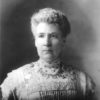calsfoundation@cals.org
George E. Lankford (1938–2023)
George Emerson Lankford III was a noted multi-field scholar and longtime professor at Lyon College in Batesville (Independence County). He published a number of books and articles on everything from Native American folklore to the history of slavery in Arkansas and was an important leader in the Independence County Historical Society.
George Lankford was born in Birmingham, Alabama, on August 18, 1938, to Elaine Jordan Lankford and George Emerson Lankford Jr. His father was a white-collar worker for an oil company, and his mother was a homemaker. Lankford graduated from high school at El Dorado (Union County) in 1956 and received a Bachelor of Arts in journalism in 1960 from Louisiana State University and a Bachelor of Divinity in 1963 from Princeton Theological Seminary. He was ordained to the ministry in what is now the Presbyterian Church (U.S.A.) and served on the staff of a Presbyterian church in New Orleans from 1963 to 1966.
Lankford taught folklore and theology at Spring Hill College in Mobile, Alabama, from 1966 to 1971, when he enrolled in the graduate program in folklore at Indiana University and studied under the legendary Richard Dorson. While at Indiana, he taught part time in the folklore program and received his PhD in 1975. His first appointment after getting his doctorate was as staff archaeologist at the University of Alabama, where he worked for one year. In 1976, he began his service at Arkansas College (now Lyon College) as assistant professor in folklore and held a variety of appointments over the years, culminating in being named the Bradley Professor in Social Sciences at Lyon in 1992, a position he held until taking early retirement in 2001. He was one of the early proponents of adapting digital capabilities and technology to teaching, leading an initiative that began in 1981. His work was supported by grants from the National Endowment for the Humanities, the Mellon Foundation, and the Rockefeller Foundation.
Lankford received outstanding-faculty awards at Spring Hill and at Lyon and, in 1991, was named the CASE/Carnegie Arkansas Professor of the Year. He served on various boards and commissions, including the Arkansas Humanities Council, the Arkansas Arts Council, the Arkansas Archeological Society, the Ozark States Folklore Society, and the Arkansas Civil War Sesquicentennial Commission. He helped edit the Independence County Chronicle for many years and volunteered with the Old Independence Regional Museum in Batesville. In addition to singing and painting, one of his hobbies was theater, and he was a frequent actor and director in productions produced by the Batesville Community Theater, which also mounted productions of his own plays.
While maintaining a strenuous teaching schedule, Lankford wrote widely and was published frequently, with articles and chapters in the Encyclopedia of Southern Culture and numerous state, regional, and national journals in folklore, history, church history, ethnohistory, archaeology, and astronomy, along with a number of books that came out while he was on the faculty at Lyon. He also did path-breaking work helping locate the various routes of the Trail of Tears through Arkansas.
After he retired from teaching, Lankford added several books and numerous articles to his already-sizeable body of writing, including Bearing Witness: Memories of Arkansas Slavery, an annotated compilation of 1930s interviews with people who had been enslaved. As part of the Federal Writers’ Project’s WPA Slave Narrative Project, one of the New Deal efforts by the Works Progress Administration (WPA) to create work for unemployed writers, the narratives were published originally according to where former slaves were living at the time they were interviewed, rather than where they had been enslaved. Lankford pulled narratives from the entire multi-state collection and, in 2003, published (with the University of Arkansas Press) in one volume the interviews of people who had been enslaved in Arkansas. A revised and expanded second edition was published in 2006. In 2007, his book Reachable Stars: Patterns in the Ethnoastronomy of Eastern North America came out. In 2009, he published Surprised by Death, a historical novel in which he solved a 150-year-old Arkansas murder.
Lankford died in Little Rock (Pulaski County) on September 18, 2023. He is buried in the Magnolia Cemetery in Mobile in the Lankford family plot.
For additional information:
“Dr. George Emerson Lankford III.” Arkansas Democrat-Gazette, September 24, 2023, p. 1K.
George E. Lankford Papers. Regional Studies Collection, Lyon College, Batesville, Arkansas.
Lankford, Jack. “In Memoriam: Dr. George Emerson Lankford III.” The Piper (Winter 2023): 49.
David Stricklin
Little Rock, Arkansas
 Divergent Prosperity and the Arc of Reform, 1968–2022
Divergent Prosperity and the Arc of Reform, 1968–2022 Education, Higher
Education, Higher Historic Preservation
Historic Preservation



Comments
No comments on this entry yet.